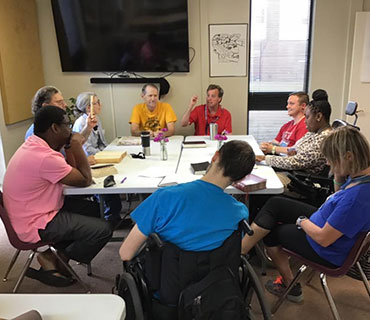The brain is the most complex organ in the human body. Each person can react differently when an injury impacts it, significantly affecting their quality of life. But a brain injury does not have to be managed alone—Eggleston offers a full continuum of person-centered services to help people living with a traumatic or non-traumatic brain injury work towards achieving their goals.
Our services specialize in various media to help individuals find brain injury resources to own their independence and integrate back into society. In addition, we offer them a safe space for developing their skills and finding productive and meaningful ways to regain control of their lives. In this guide, we will break down brain injuries, the functions of brain injury services, and the potential benefits they propose.
What is a Brain Injury?
A traumatic brain injury (TBI) results from a sudden bump, blow, or jolt to the head or body or an object penetrating the brain. All painful bangs to the head do not cause a TBI. A TBI can cause short-term and/or long-term issues with normal brain function, such as cognition, behavior, or physical limitations. More severe TBI cases can sometimes lead to permanent immobility or death.
A brain injury can also be non-traumatic. This kind of brain injury is caused by a lack of oxygen (anoxia), exposure to toxins, pressure from a tumor, stroke, infections, and more.
Types of Brain Injuries
Traumatic brain injuries may be primary or secondary, meaning some cases can be immediate while others may appear over time. While primary brain injuries are discovered following the incident, secondary brain injuries gradually show within days, weeks, or months. Secondary brain injuries may also result from the treatment used after the initial head trauma.
Along with whether a brain injury is primary or secondary, two types of TBI are classified based on the kind of injury.
Penetrating TBI (or open TBI):
This is caused when an object pierces the skull and brain tissue, like a bullet, bone fragment, sharp weapon, or shrapnel. Penetrating TBI damages are usually localized to one area of the brain.
Non-penetrating TBI (or closed head injury; blunt TBI):
This happens when something with powerful force shifts the brain within the skull. Some relevant incidents include a fall, blunt force to the head, or motor vehicle accidents.
Brain Injury Services and Their Functions
Brain injury services help people with an injury gain all that life can offer with a comprehensive, personalized approach. People’s needs vary depending on their brain injury severity and personal goals. At Eggleston, we offer brain injury services to the community to focus on strengths and abilities, not disabilities.
Case Management
One of the programs offered to people with brain injuries is Case Management. This service focuses on minimizing institutionalization and maximizing the client’s potential to utilize resources for remaining in the community. Examples of these resources include insurance, transportation, home care, housing, medical care, and employment, among others. The Case Manager will also collaborate with other organizations to maximize assistance for clients and their families effectively. They will additionally cater to each individual’s unique service plan and goals with guidance, education, and focused insight.
Case Management empowers individuals with brain injuries by identifying the steps needed to achieve a fulfilling lifestyle with community resources and other helpful services or providers. If you live with a brain injury, you can choose the location you wish to meet with your Case Managers—such as a restaurant, library, or the comfort of your home.
Beacon House
Eggleston provides a clubhouse for people with an acquired brain injury (ABI): Beacon House. Here, there are no “patients” but dedicated members who collectively work together to achieve their goals. It is a program designed for individuals to capitalize on their strengths. Members can benefit from this program by rebuilding social relationships, for friendship, family, employment, and self-advocacy. This restorative environment makes recovery possible by giving members the individual support they need.
Support Groups
Research shows that social skills can develop after a TBI, elevating the need for better social environments among people with brain injuries. Whether managing your brain injury alone or with a family caregiver, it’s important to socialize with other people to drive productivity and happiness. Eggleston offers support groups for people with brain injuries to amplify their voices and support groups for caregivers, family, and friends.
Eggleston: Shaping a Better Future
For over 67 years, Eggleston has engaged in education, training, and employment for adults with disabilities. Our mission is to create a safe place for individuals with disabilities to promote a healthier, happier, and more productive life.
To see eligibility for our brain injury services in Virginia, visit our website or contact us today.
